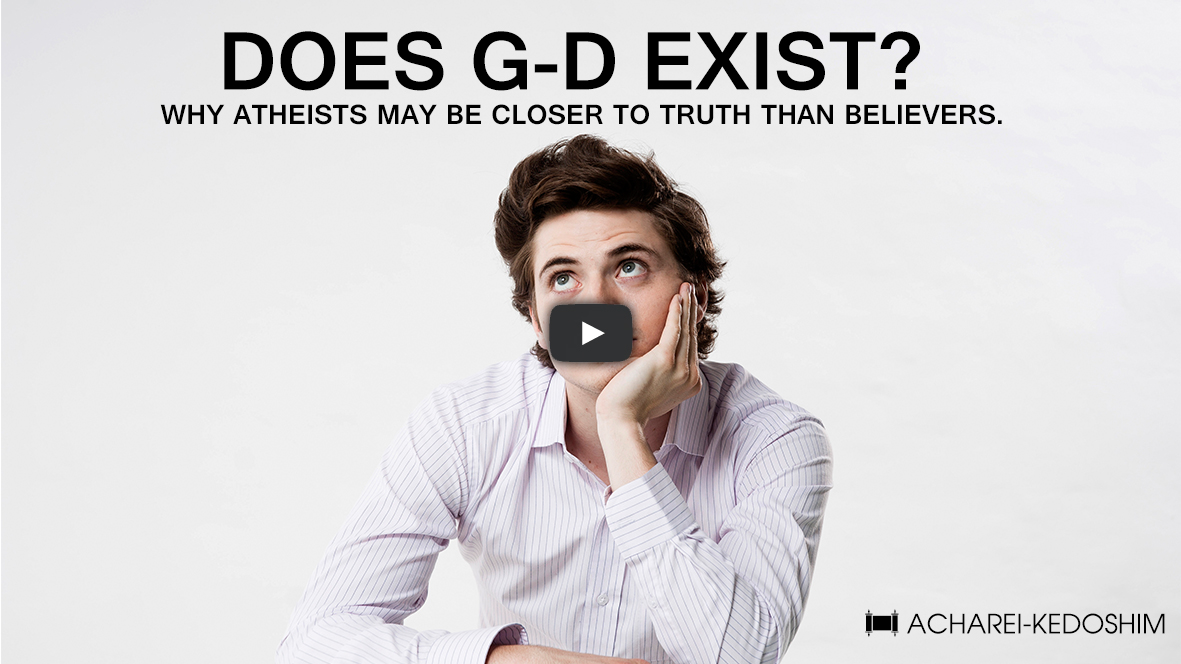Atheists, Agnostics and Believers
The god you don’t believe in, I too don’t believe in.
Rabbi Levi Yitzchak of Berditchev
A number of years ago self-proclaimed atheist Michael A. Newdow brought a case before the Supreme Court arguing to remove the words “under G-d” from the Pledge of Allegiance. A year earlier Dr. Newdow won a decision in the United States Court of Appeals for the Ninth Circuit in San Francisco, that the addition of “under G-d” turned the pledge into a “profession of religious belief” and made it constitutionally unsuitable for daily recitation in the public schools. Now that decision was being appealed in the Supreme Court.
This case glaringly reflects the clash between belief and atheism in our modern times, and brings to the fore the big question: Do we need faith?
Indeed, this is the theme that lies at the heart of the season we are now entering. As we approach the holiday of Purim and then prepare for Passover, we revisit the importance of faith and its role in our lives. Passover is known as the holiday of faith. The Matzah eaten on Passover is called “food of faith.” Indeed, the Bible tells us that the Jewish people are “believers children of believers,” and faith is emphasized time and again throughout the Biblical account of Exodus.
So here we have the modern day confrontation between an atheist and the American public’s declaration of “one nation under G-d.” Dr. Newdow is arguing that the daily recitation of the Pledge of Allegiance in his daughter’s public school classroom violates the Constitution as long as the pledge contains the words “under G-d.”
I have a few questions to self-proclaimed atheists. Perhaps one day I can do a radio show and interview a few atheists, agnostics and believers…
Frankly, I never understood atheists. Agnosticism is one thing. I can see how someone has doubts and is unsure whether G-d exists. But atheism? How can one be absolutely sure and convinced that G-d does NOT exist? An atheist’s irrational conviction can sound awfully like blind faith.
I understand that a person may emotionally choose to not believe in G-d, but that should be confused with an absolute rationale that G-d does not exist. No one can prove that G-d does not exist as no can absolutely prove that G-d exists (see below). Arguments can be made either way, but the final conclusion is not driven by logic. For believers it is driven by faith. But what drives an atheists absolute belief that G-d does not exist?
Some have argued that the atheist’s belief is driven by his unwillingness to accept G-d’s authority over his life. In other words, the atheist does not have empirical proof that G-d does not exist; he personally rejects G-d. Similar to a person of faith who may not have empirical proof for G-d’s existence, yet he personally chooses to believe, or he instinctively, intuitively or emotionally just knows that G-d exists.
Do you, Mr. Atheist, have the same type of instinct, intuition or emotion that G-d does not exist?
Is an atheist worshiping himself and his views with the same irrational certainty of which he accuses believers?
Another ironic observation: The Declaration of Independence opens up with these words:
“We hold these truths to be self-evident, that all men are created equal, that they are endowed by their Creator with certain unalienable Rights, that among these are Life, Liberty and the pursuit of Happiness.”
This declaration, based on the belief in the Creator, guarantees the right of every person, including an atheist, to choose not to believe in G-d.
So here’s the big question: Would an atheistic declaration allow believers to choose faith in G-d? In other words: If atheism is true, and there is no Creator that endowed us all with equal unalienable rights, who says that we are all equal? Maybe some of us are more equal than others, as the monarchs believed. Indeed, as Solicitor General Theodore B. Olson argued before the court, “under G-d” was one of various “civic and ceremonial acknowledgments of the indisputable historical fact that caused the framers of our Constitution and the signers of the Declaration of Independence to say that they had the right to revolt and start a new country.” The framers believed:
“That G-d gave them the right to declare their independence when the king has not been living up to the unalienable principles given to them by G-d.”
Thus the great irony: The king, had he so chosen, would never have given a Dr. Newdow the time of day to argue the case for atheism, let alone to practice it. Only believers in G-d gave you that right.
True, throughout history we have witnessed the horrible consequences of “authorities” imposing their dogmatic “religious” views on others, to the point of terrible persecution, killings and total intolerance. But I submit that they are neither models of faith nor of what it means to be a G-d fearing person. Just because someone dons religious garb and the mantel of the clergy doesn’t mean that he is truly G-dly. Cruelty, power, control and demagoguery can take on many shapes and mantels.
This definitely does more than justify the fear many of us have of state controlled religion and governments imposing their beliefs on their citizens. Hence, the separation of church and state in this country.
But the same founders that separated church and state – and no one had to remind them of religious abuse – are the same people who wrote:
“We hold these truths to be self-evident, that all men are created equal, that they are endowed by their Creator with certain unalienable Rights.”
For them there was no contradiction, because these words clearly state the idea of a universal Creator, not a Christian, Muslim or Jewish G-d, but One Who created us all, and endowed us with unalienable rights.
These rights include the right to choose no religion and even to not believe. Yet, the very foundation of all choices is based on belief in G-d. If there is no Creator Who created us as equals, perhaps we are really not equals? Eliminate that axiom and there is no guarantee that we each have the power to choose.
The Founding Fathers and the framers of the Constitution clearly meant that freedom of religion is precisely that: freedom of religion, not from religion.
This brings us to some thoughts on faith. What exactly is faith? As stated above, no one can empirically prove with absolute certainty that G-d exists. As we see daily, that people can choose to question G-d’s existence. Indeed, that is exactly how G-d created the universe. He created an agnostic world, in which he concealed His presence to the extent that we must struggle to discover Him.
The mystics explain this phenomenon with the Lurianic doctrine of Tzimtzum. In some mysterious way G-d turned reality “inside out.” He concealed His Divine light, His conscious presence so as to allow “room” for an independent entity to perceive its own independence, to the extent that we humans feel that we are “where it’s at” and G-d is “out there,” when in fact G-d is “reality” “where’s it’s at” and we are the newcomers.
Hence, faith. True faith is not some blind childish acceptance of irrational beliefs. Faith is a sophisticated tool that works hand in hand with logic and reason. It is the recognition that intellectual inquiry leads one to the conclusion that reality is more than just the mere sum total of the human mind. Reason leads us to a “door” that the “bigger picture” encompasses much more than reason and beyond reason. Faith is the way we enter that door.
With the exodus from Egypt human history had its first collective dosage of faith. An entire nation was enslaved by another. They were brutally oppressed and dehumanized. They were then freed. This freedom was a demonstration that there is a force in life that is more powerful than human injustice, and when that force prevails, justice is served. If humans were the only controlling force in existence justice would have no guarantee of being served. After all, humans can be the cruelest to one another.
As one Holocaust survivor stated, when asked by an atheist how he can believe in G-d after experiencing G-d’s silence, the survivor replied: If anything, the Holocaust taught us how we no longer can believe in man, and our only hope is to rely on G-d.
Thus, the opening of the Ten Commandments:
“I am your G-d that took you out of Egypt.”
All the morality in the following Commandments, which is the basis of all civilization, is built upon the first statement that G-d personally intervenes and can free us from the “Egypt” in our lives. Murder, theft and all forms of immorality have no foundation to stand on if there is no absolute authority that dictates these laws. Take away G-d from the picture and we are left with moral relativism.
The Declaration of Independence actually mirrors the Ten Commandments in the sense that it too opens up with a an axiomatic statement, “We hold these truths to be self-evident, that all men are created equal, that they are endowed by their Creator with certain unalienable Rights,” upon which is built all the rights and freedoms that follow.
This is all part of faith – the faith that was born in the exodus of Egypt and is revisited and nourished each year in the holiday of Passover.
And it is precisely this faith that so absolutely recognizes the dignity of human beings and his or her sacred right to free will, that it allows a person to choose to be an atheist, as irrational as it may be!
Dr. Newdow told the justices:
“I am saying I as her father have a right to know that when she goes into the public schools she’s not going to be told every morning to stand up, put her hand over her heart, and say your father is wrong, which is what she’s told every morning. Government is doing this to my child. They’re putting her in a milieu where she says, ‘Hey, the government is saying that there is a G-d and my dad says no,’ and that’s an injury to me.”
Dear doctor, is it at all possible that you may be wrong and G-d does actually exist? And if so, is your injured ego more important than your daughter’s pursuit of truth? Are you perhaps taking yourself too seriously, just as you accuse believers of?
I will concede one thing to atheists. People representing “religion” have given you many good reasons to reject G-d. Even how some dogmatic individuals present the Pledge of Allegiance gives good cause to reject its reference to G-d.
But don’t allow other people’s distortions to get in your way of finding the truth.
This perhaps is the cruelest thing that we humans can do to each other: Distort our attitudes and disfigure our impressions toward G-d, truth and reality.
But after all is said and done, our journey goes on. All of us – believers, agnostics and atheists – share the most sacred journey of all: our search for G-d.
Hold on to the search. Never give up. That is the ultimate dignity.







